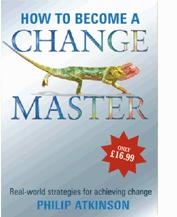The Politics of Matrix Management and the External Change Maker

Many organisations are failing to change at a deep enough level to master the challenges that face them in building a Matrix culture. This means they require creating and developing their own team of Change Agents, Coaches and Facilitators that can instigate change at a very deep level.
This will take place only when the people who drive change have a wide range of talents not just focused on 'change methodologies' but, more importantly, are focused on being able to understand the politics of change and engage and influence key parties and stakeholders.
Change Management Capability
Increasingly, Organisations are focused on creating their own change management capability. This should lead to continuous self-renewal for the organisation but may fall short because the competencies focused upon are solely technical.
To be effective, change makers must be both flexible and resilient in operating in a political arena, while understanding the relationships and power of the key players in the old silo driven organisation, and the emerging Matrix organisation.
Deep personal change requires an ability to win the 'hearts and minds' and the ability to engage with others at an emotional level, developing a high degree of mutual trust against a political backdrop.
The Political Arena
Living in the real world requires us to view organisations as social and political systems with interest groups competing for scarce resources, and this becomes even more prevalent when we peel away the old structures and replace them with sleek, fast moving new error-free processes.
Consultants, whether external or internal, who fail to take account of the political and cultural dynamics of a business, will fail to fully harness the real forces behind moving from the 'current' to a 'desired' state of functioning.
Competing Demands, Conflict and Matrix Organisation
Conflict is an incredibly powerful positive force if well managed. Because conflict is by its nature a cocktail of mixed emotions, many of those delivering change feel they cannot deal with it.
Failure to develop expertise in the political and behavioural component of change may lead change makers to focus on conflict containment instead of handling it up front. This is especially evident in the Matrix organisation where people are unsure of how things will evolve.
Remember, we are talking about things very dear to a person's life - their career, their ambitions and their future. There needs to be a strong preference to move away from a need to dominate, control and contain conflict, instead using it as a learning vehicle for improving the culture of the whole business.
Change from Hierarchy to Matrix is Complex
We know that the process of managing change is far more complex than current theory suggests. Change has to take account of the people operating in a complex social system; including the world of personal egos, emotions, attitudes, motivations, drives, behaviours and political chicanery.
Working on an emotional and behavioural level helps internal and external Facilitators or Change Agents to pre-empt resistance to change.
A cultural norm is that change is not welcomed with open arms. We tend to gravitate to our own comfort zone - that area where we can be sure that our performance can stretch to the expectations of self of others. When we stretch beyond our zone of comfort we can become very unsure of ourselves, and our ability to meet the new demands and standards.
Tailored Approach to Building the Matrix Culture
Every business that is moving from a traditional, to a Matrix, culture and structure has a unique history, culture and background, founded by people with different personal value systems and beliefs, and each operating in very different arenas.
Because every organisation operates in a special political and economic context and is different, the approach to change that will facilitate the ease of improvement for each business will also differ radically. What works for a City Institution in London, England, will not work for a Manufacturer of agricultural products in Wisconsin, USA. Some of the principles may be similar, but the methodology, when applied, will make assumptions about the culture, the politics and the context of the business which will have major impact on the success of the change.
Final Words
So, those responsible for delivering change need the political acumen, resilience and the psychological skill to know when to employ the right strategy for the occasion and how to deal with conflicts.
Any issues please email me direct or use the contact form
This will take place only when the people who drive change have a wide range of talents not just focused on 'change methodologies' but, more importantly, are focused on being able to understand the politics of change and engage and influence key parties and stakeholders.
Change Management Capability
Increasingly, Organisations are focused on creating their own change management capability. This should lead to continuous self-renewal for the organisation but may fall short because the competencies focused upon are solely technical.
To be effective, change makers must be both flexible and resilient in operating in a political arena, while understanding the relationships and power of the key players in the old silo driven organisation, and the emerging Matrix organisation.
Deep personal change requires an ability to win the 'hearts and minds' and the ability to engage with others at an emotional level, developing a high degree of mutual trust against a political backdrop.
The Political Arena
Living in the real world requires us to view organisations as social and political systems with interest groups competing for scarce resources, and this becomes even more prevalent when we peel away the old structures and replace them with sleek, fast moving new error-free processes.
Consultants, whether external or internal, who fail to take account of the political and cultural dynamics of a business, will fail to fully harness the real forces behind moving from the 'current' to a 'desired' state of functioning.
Competing Demands, Conflict and Matrix Organisation
Conflict is an incredibly powerful positive force if well managed. Because conflict is by its nature a cocktail of mixed emotions, many of those delivering change feel they cannot deal with it.
Failure to develop expertise in the political and behavioural component of change may lead change makers to focus on conflict containment instead of handling it up front. This is especially evident in the Matrix organisation where people are unsure of how things will evolve.
Remember, we are talking about things very dear to a person's life - their career, their ambitions and their future. There needs to be a strong preference to move away from a need to dominate, control and contain conflict, instead using it as a learning vehicle for improving the culture of the whole business.
Change from Hierarchy to Matrix is Complex
We know that the process of managing change is far more complex than current theory suggests. Change has to take account of the people operating in a complex social system; including the world of personal egos, emotions, attitudes, motivations, drives, behaviours and political chicanery.
Working on an emotional and behavioural level helps internal and external Facilitators or Change Agents to pre-empt resistance to change.
A cultural norm is that change is not welcomed with open arms. We tend to gravitate to our own comfort zone - that area where we can be sure that our performance can stretch to the expectations of self of others. When we stretch beyond our zone of comfort we can become very unsure of ourselves, and our ability to meet the new demands and standards.
Tailored Approach to Building the Matrix Culture
Every business that is moving from a traditional, to a Matrix, culture and structure has a unique history, culture and background, founded by people with different personal value systems and beliefs, and each operating in very different arenas.
Because every organisation operates in a special political and economic context and is different, the approach to change that will facilitate the ease of improvement for each business will also differ radically. What works for a City Institution in London, England, will not work for a Manufacturer of agricultural products in Wisconsin, USA. Some of the principles may be similar, but the methodology, when applied, will make assumptions about the culture, the politics and the context of the business which will have major impact on the success of the change.
Final Words
So, those responsible for delivering change need the political acumen, resilience and the psychological skill to know when to employ the right strategy for the occasion and how to deal with conflicts.
Any issues please email me direct or use the contact form

